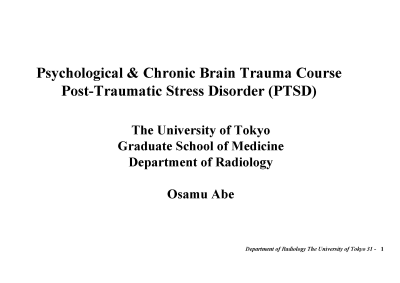Weekday Course
Psychological & Chronic Brain Trauma
ISMRM & ISMRT Annual Meeting & Exhibition • 04-09 May 2024 • Singapore

| 13:30 |
Neuroimaging in childhood trauma: Exploring the hidden effects
through large-scale MRI Studies
Karen Caeyenberghs
Keywords: Neuro: Brain, Neuro: White matter, Neuro: Brain Connectivity Numerous MRI studies have linked behavioral deficits to different properties of brain regions, fibre pathways, and brain networks in children with traumatic brain injury. While promising, these MRI studies have revealed weak to moderate relationships. In this presentation, I will outline new directions associated with the examination of brain-behavior relationships in pediatric TBI: (i) participation in large-scale consortia to obtain larger and more diverse samples; (ii) employ specific brain and behavioral metrics (using advanced models and ecological momentary assessments); (ii) conduct integrated network analyses to examine complex relationships; and (iv) use tools to deal with the large heterogeneity in lesions. |
|
| 14:00 |
 |
Post-Traumatic Stress Disorder (PTSD)
Osamu Abe
Keywords: Neuro: Brain, Neuro: Brain Connectivity The most robustly identified findings in PTSD include hyperactivation of the amygdala and dorsal anterior cingulate cortex, hypoactivation of the ventromedial prefrontal cortex, and atrophy of the hippocampus. These brain changes are thought to impair fear learning, threat detection, contextual processing, executive function, and emotional regulation in PTSD. The triple-network model of PTSD proposes that the disorder is characterized by hypoactivation of the default mode network and central executive network and hyperactivation of the salience network (SN). This imbalance is thought to lead to the symptoms of PTSD, such as re-experiencing, avoidance, and negative alterations in mood and cognition. |
| 15:00 |
Coma
Nadya Pyatigorskaya
|
|
| 15:30 |
Mild Traumatic Brain Injury
Michael Zeineh
Keywords: Neuro: Nervous System, Neuro: Neurodegeneration, Neuro: Brain Mild traumatic brain injury (mTBI) is a very common condition with millions occurring annually in the US and worldwide. The majority of mTBI cases have a lack of complete recover 6 months after injury. At the same time, the majority of mTBI have normal conventional imaging. The need for imaging is to detect the abnormalities that underly the long-term cognitive changes, and to detect them at an early stage. This discussion will review multi-modal imaging in mild TBI. |
The International Society for Magnetic Resonance in Medicine is accredited by the Accreditation Council for Continuing Medical Education to provide continuing medical education for physicians.